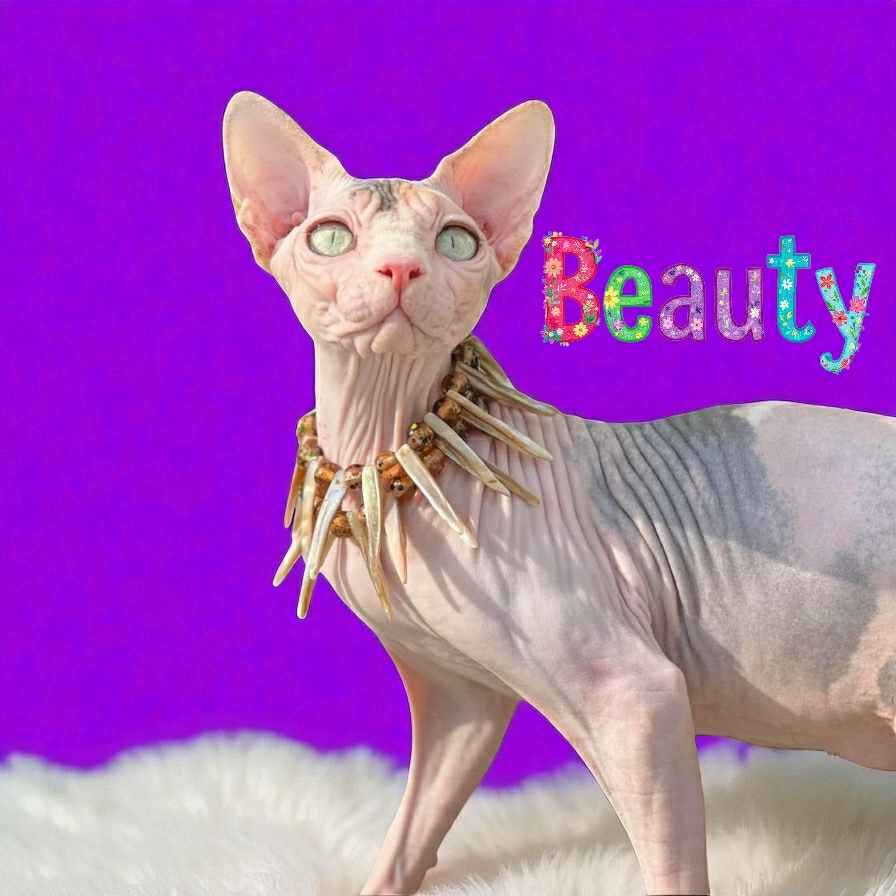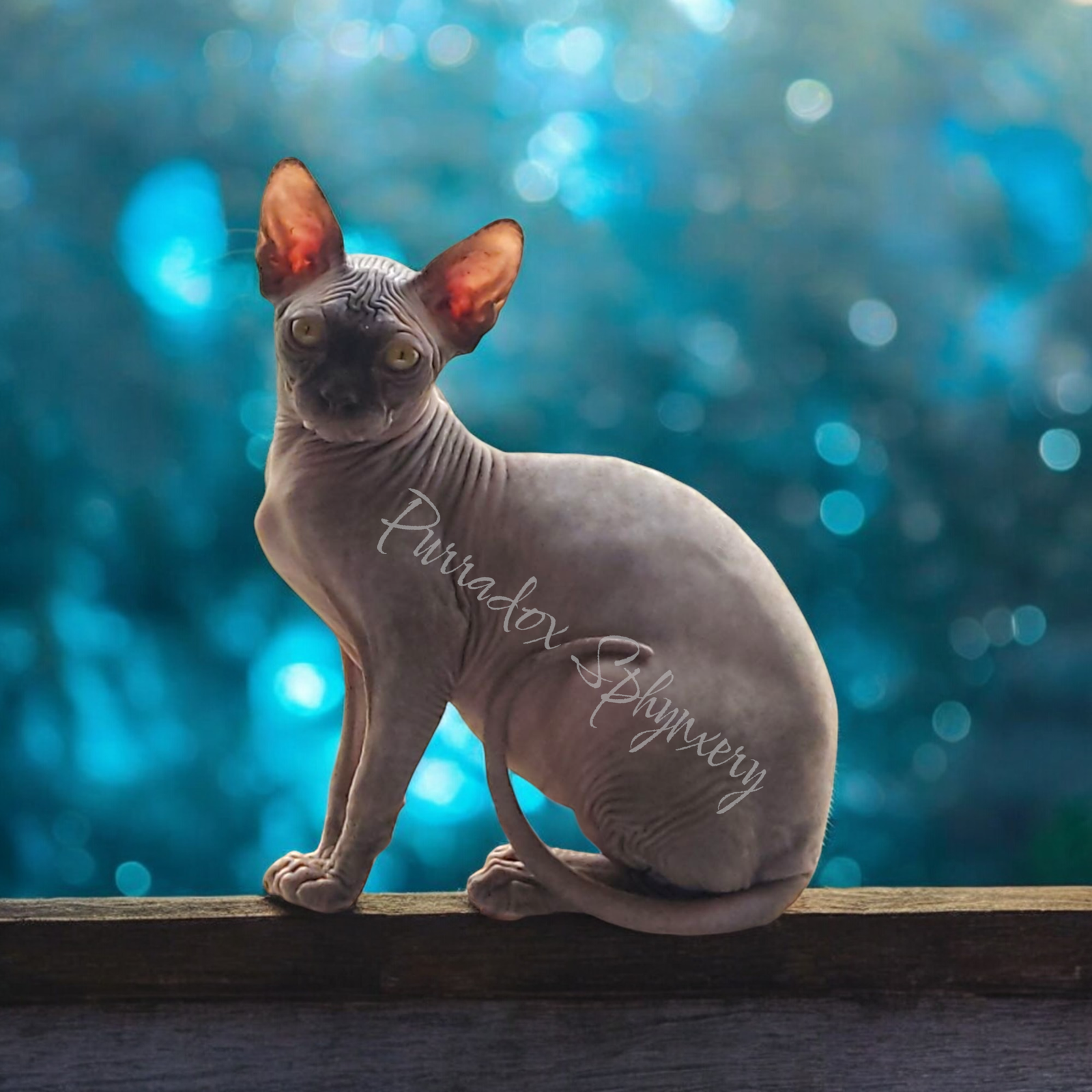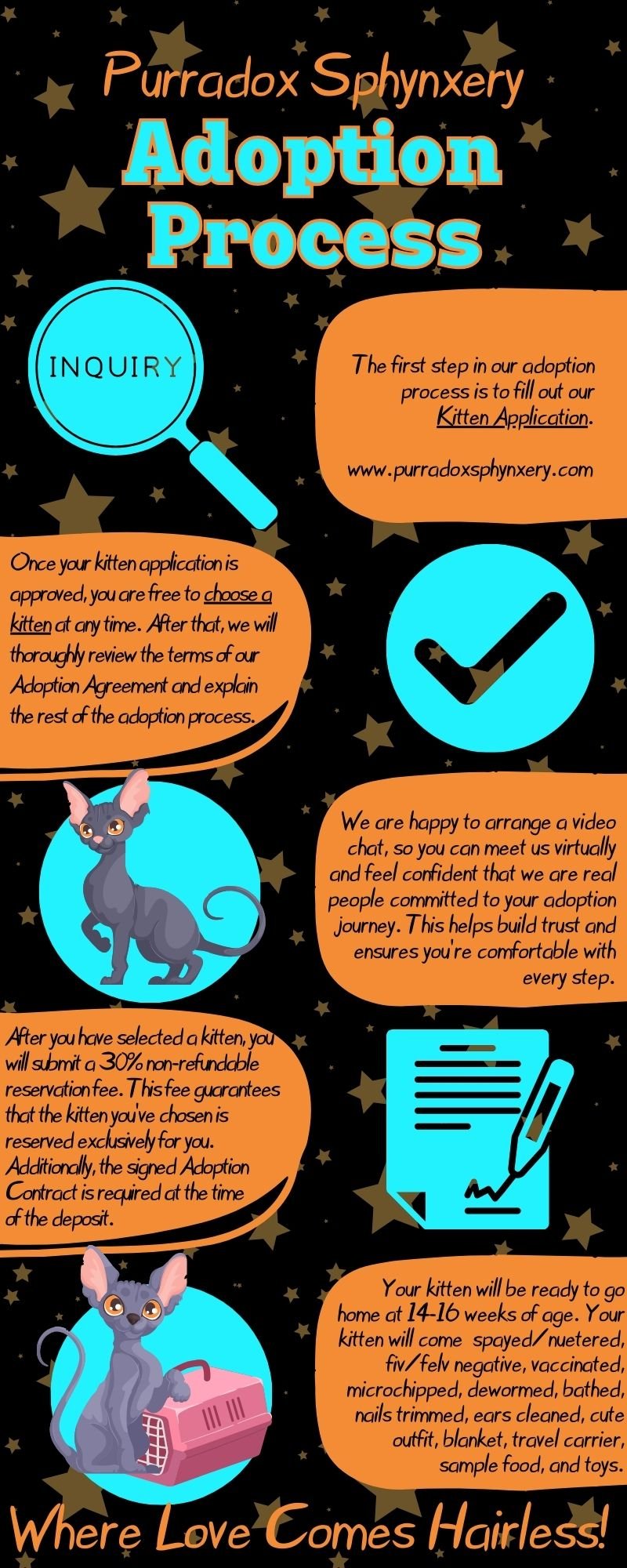Sphynx Cats for Sale | Georgia’s Ethical Sphynx Breeder
Where Love Comes Hairless
Welcome to Purradox Sphynxery—your trusted source for Sphynx cats for sale in Georgia and across the USA. As a TICA-registered, ethical breeder of healthy, hairless Sphynx kittens, we focus on health, quality, and lifelong support.
Trusted Breeder of Hairless Sphynx Kittens with Health Guarantees
Sphynx Adoption
Your journey to hairless love starts here. Learn about our luxury Sphynx Cat adoption process.
Sphynx Pricing
Explore our luxury Sphynx pricing and programs to find the perfect Sphynx kitten for your family.
Available Kittens
View our available Sphynx Kittens to find your new hairless family member.
Kitten Application
Take the First Step Toward Your New Hairless Sphynx Kitten! Complete our Sphynx Kitten Application!
Who We Are at Purradox Sphynxery
Dedicated to Raising Loving, Purebred Sphynx Kittens.
Purradox Sphynxery is a TICA-registered, ethical Sphynx cattery located in South Georgia, dedicated to raising purebred, healthy, and affectionate hairless cats. Founded on the principles of compassion, health, and transparency, the cattery offers specialized breeding programs—the Classic, Modern, Ultra, and DBE (Dominant Blue and Odd Eye) Programs—designed to celebrate the unique beauty and temperament of the Sphynx breed.
At Purradox, every kitten is raised as part of the family—not in kennels, but within a loving home environment. Through early training, daily socialization, and hands-on care, kittens grow into confident, affectionate companions ready to bond with their new families.
All breeding cats are DNA tested, screened annually for HCM by a licensed feline cardiologist, and guaranteed FIV/FeLV negative. This commitment to responsible breeding ensures that each kitten is healthy, well-adjusted, and ready to thrive.
Before going home, kittens are spayed or neutered, vaccinated, microchipped, and fully examined by a licensed veterinarian. Every adoption includes a comprehensive health record, starter kit, and lifelong support from the Purradox community.
Choosing Purradox Sphynxery means becoming part of a supportive network of Sphynx cat lovers who value quality, ethics, and heart.
🐾 Giving Back: Each adoption contributes $100 to Hearts to Homes, a 501(c)(3) non-profit rescue dedicated to helping domestic cats in need—because compassion extends beyond the cattery walls.

Why Choose Our Ethically Bred, TICA Registered Sphynx Kittens
More than a breeder — we’re your kitten’s first family.
At Purradox Sphynxery, every kitten is more than a pet—they’re part of the family from the very start. Our kittens are lovingly raised in our home, handled daily, and socialized to ensure exceptional temperaments. We breed exclusively from health-tested, DNA-screened, and HCM-scanned parent cats, ensuring the best foundation for each litter.
As a TICA-registered, ethical Sphynx breeder, we’re committed to responsible breeding practices and the lifelong health and happiness of every kitten we raise. From genetic testing and vet checks to luxury traits like beautiful wrinkles and soft skin, every kitten reflects our focus on quality and care.
✨ Hover over the boxes below to explore 8 reasons families choose Purradox Sphynxery.
Genetic & Health Testing
Effortless Adoption
Pedigree Lineage
Ethical Breeding
Unmatched Temperament
Exceptional Care
Lifetime Support
Luxury Traits
Because for us, breeding isn’t just a business—it’s a promise of lifelong companionship.
Join us on Social Media!
Guided by Love: Our Vision and Mission
At Purradox Sphynx Cattery, our vision and mission reflect our passion for raising the most affectionate Sphynx cats and creating lasting connections with loving families.
We dream of a world where Sphynx cats are cherished for their unique beauty and loving personalities. Our vision is built on ethical breeding, responsible care, and a lifelong commitment to every kitten we raise. We’re dedicated to creating a community that values health, happiness, and the well-being of every Sphynx kitten, ensuring they thrive in loving homes while protecting the future of this incredible breed.
To bring joy and love into homes through the adoption of healthy, ethically bred Sphynx kittens. We focus on rigorous health testing of our parent cats, compassionate, hands-on care, and lifelong support for every adopter. Our goal is to raise exceptional, loving companions while setting the standard for responsible, ethical Sphynx breeding.
Purradox priority List
Find your purr-fect match
Discover the joy of finding your purr-fect match at Purradox Sphynxery.
Our lovingly raised, hairless Sphynx kittens are waiting to join their forever families. Through our exclusive Classic, Modern, Ultra and DBE Sphynx Programs, you’ll find uniquely stunning companions with exceptional quality, personality, and care behind every whisker.
🛑 Want early access before the public?
👉 Click here to learn how to join the Priority List and gain exclusive access.
Upcoming Litter Announcements



Priority Membership Access
Enter the Priority Member Zone
Enter the Priority Member Zone to view upcoming litters before anyone else. This page is password protected and reserved for serious adopters on our Priority List.
Sphynx Cat Resource Center
Welcome to the Sphynx Cat Resource Center—your trusted guide for all things hairless cats. Whether you’re preparing for your first kitten or a seasoned Sphynx owner, our blog offers expert Sphynx cat care tips, essential hairless cat grooming advice, and practical guidance for every stage of life. From skin care and nutrition to socialization and health, we’re here to help you raise a happy, healthy Sphynx cat.
👉 Explore our latest articles and discover everything you need to know to care for your hairless companion—click below to start learning!
Schedule A Call
Schedule a phone call with Ashley Long.
We're only one call away
Interested in adopting a hairless Sphynx cat? We’re here to help make the process as easy as possible. Schedule a call with Purradox Sphynxery’s owner, Ashley Long.
- Discuss Adoption Process
- Timeline for available kittens
- Adoption Prices
- What's included
- Waitlist information
Common Questions
Most Popular Questions
At Purradox Sphynxery, we focus on ethical, transparent breeding with a passion for health, temperament, and lifelong support. All our kittens are HCM screened annually, FIV/FeLV negative, Wisdom DNA tested, and vet-certified before going home. We also offer unique programs like Signature, Prestige and Elite.
🔗 Learn more about our cattery programs.
Our Sphynx kittens typically range from $2,500 to $3,500, depending on eye color, coat pattern, and program type. Each kitten comes spayed/neutered, microchipped, vaccinated, and packed with essentials.
🔗 Explore our Sphynx Pricing.
Yes! Health is our top priority. All kittens are tested through Wisdom Panel Optimal Selection, are dewormed, vaccinated with FVRCP, and receive a certified health certificate before leaving.
🔗 Read about our health protocols.
Each kitten comes home with:
Spay/neuter
Microchip
At least two FVRCP vaccines
Deworming
Health certificate
Goody bag with toys, food, and clothing
A comprehensive Go-Home Guide for new owners
🔗 View our Kitten Go-Home Guide
To reserve a kitten, simply apply online. Once approved, you may submit a $100 Priority Member deposit to join our waitlist or select an available kitten.
🔗 Start your application here
Our kittens go home between 14 and 16 weeks of age. This gives them plenty of time to develop socially, receive vaccinations, and heal from spay/neuter.
🔗 View our Kitten Go-Home Guide
Yes, we offer ground and flight nanny transport options across the United States for an additional fee. We help arrange safe, comfortable travel for your kitten.
🔗 Contact us for transport options.
Our Available Kittens page is updated regularly with photos, descriptions, and reservation options. If no kittens are listed, you may join our Priority List.
🔗 Check available kittens here
We raise our kittens in-home using early socialization techniques. They’re introduced to bathing, nail trims, car rides, children, and even other pets.
🔗 Learn how we raise our kittens
At Purradox Sphynxery, each adoption program is designed around a distinct type of Sphynx cat, helping families find the look and personality they love most.
Classic Program: These Sphynx kittens have the traditional or “old-style” Sphynx appearance. They feature longer muzzles, slimmer builds, and moderate wrinkles. This is the type of Sphynx originally developed in the breed’s early history.
Modern Program: Our Modern line showcases Sphynx cats with a more compact, rounded look. These kittens typically have shorter muzzles, fuller cheeks, and increased facial and body wrinkles—an exotic look many families love.
Ultra Program: These are the most dramatic of all. Ultra Sphynx kittens have a Persian-style face with an ultra-short nose, flat features, and extreme wrinkles. They’re rare and eye-catching, perfect for those wanting a show-stopping appearance.
DBE Program (Dominant Blue Eye): This special line includes either Classic or Modern Sphynx cats that carry the rare dominant blue eye gene. These kittens may have two vibrant blue eyes or be “odd-eyed” with one blue and one gold or green eye—even without white coats.
No matter the program, every kitten at Purradox is health-tested, well-socialized, and raised with care. These programs help adopters choose a Sphynx kitten that fits their aesthetic preferences and lifestyle.
We’re located in South Georgia but serve kitten families nationwide. We frequently place kittens in Florida, North Carolina, Texas, California, and beyond.
🔗 Contact us for nationwide adoption
Yes! We encourage dual adoptions for companionship. If you adopt from us and a cat from Hearts To Homes Rescue, we’ll even cover the rescue cat’s fee.
🔗 Learn about our adoption bundle offer
We offer a 2-year congenital health guarantee, a lifetime of breeder support, and guidance on proper care, HCM screening, and nutrition.
🔗 See health guarantees in our contract
Purradox Sphynxery is your luxury cattery for Sphynx cats and kittens of every color. Our kittens are socialized from birth and the most affectionate kittens. We offer transport services anywhere in the USA.
Let's Connect
Paws and Say Hello
Contact us today and take the first step toward welcoming a loving, health-tested Sphynx companion into your life!


